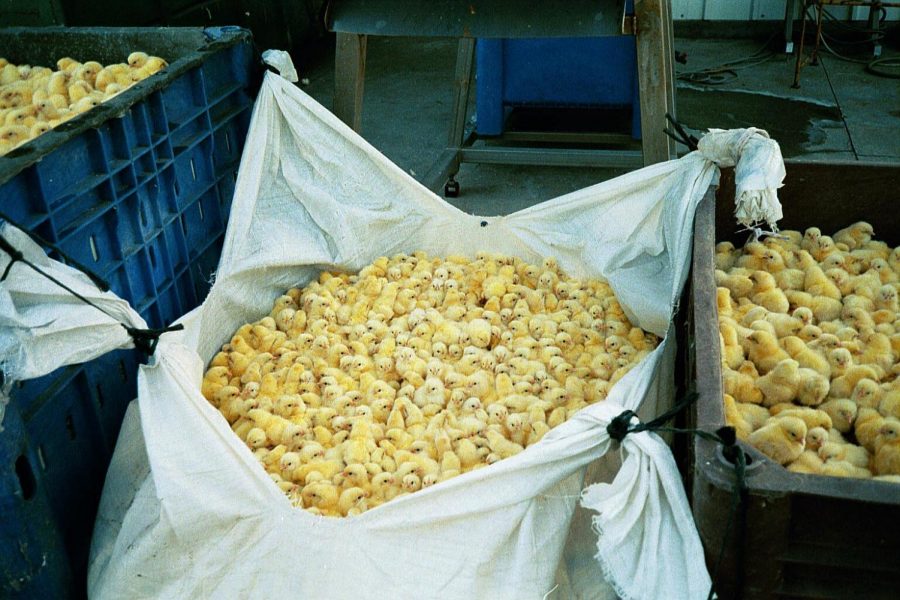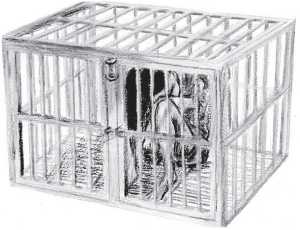France ban on chick culling takes step forward for animal rights
Flickr
Male chickens produce neither eggs nor palatable meat, so they are not useful in the poultry industry.
March 21, 2020
Countless chickens are hatched in order to produce the 65 billion chickens that are consumed each year. However, male chicks are deemed unpalatable, resulting in the deaths of seven billion chicks annually.
This process, known as chick culling, is more common than we like to think: most of us have never eaten a male chicken in our lives. In a statement released on Jan. 25, France vowed to ban this process by 2022.
Male chicks are often culled because they are unprofitable to both small-scale farmers and to large-scale corporations. Roosters don’t provide eggs, and due to their testosterone, the taste of their meat is considered undesirable. Consequently, male chicks are often culled by shredding or asphyxiation with carbon monoxide.
The anti-animal cruelty effort is being led by French Agriculture Minister Didier Guillaume. Along with Germany, France is attempting to develop a new method that will determine the sex of chicks before they are hatched.
This technology will use sex hormones found in what is “essentially the embryo’s pee,” according to Almuth Einspainer, a veterinary endocrinologist at Leipzig University in Germany.
If this method works, scientists will be able to prevent the births of male chicks, thereby preventing their deaths. The eggs will have a market across Asia and the Pacific Islands, where many consume fertilized eggs with terminated chick fetuses.
Another possible benefit of this technology is lowered costs of breeding, as space and energy aren’t spent incubating male eggs. However, the feasibility of applying this technology remains unknown.
“It’s not a very widely utilized technology, and it’s also really expensive right now,” Dougherty Valley High School AP Environmental Science teacher Ms. Annie Nguyen said. “So you know, Farmer Joe can’t just do that.”
Ground chicks are also often used in animal feed and fertilizer. The idea that cat and dog food in stores may use shredded chicks as an ingredient is unnerving but also significant: the abuse of farm animals is pervasive and invades many aspects of our lives, so much that even vegetarians can’t escape its far-reaching effects.
“There are all kinds of documentaries that are out there right now that largely focus on the way cows, chickens and pigs are treated. We also want to consider the effect [raising farm animals] has on plants. Even vegetarians are part of that food ecosystem.” Nguyen said.
While France’s ban is a definitive step in the right direction, chick culling remains legal — and widespread — in many other countries. The United States only recently banned chick culling this year. Germany has outlawed chick culling, but will allow the process until an alternative, such as the sex-determination technology, is tested and confirmed.
There is no easy answer to this problem. Although chick culling is unquestionably inhumane, it is more profitable and resourceful for the meat industry.
One option is that we could adjust our expectations for how chicken tastes and bring rooster meat into supermarkets as well. After all, some European countries will eat male chickens, called capons. The question then becomes whether it is ethical to prevent a death at birth, only to raise the bird toward its inevitable slaughter.
On a side note, capons are roosters who have been castrated— essentially, their flow of testosterone is cut off, in an effort to improve the taste and texture of their flesh. The castration is done without anesthesia and risks fatal damage to the bird’s artery and kidneys, essentially torturing the animal for human needs.
The other option is to just eat less poultry. But unless meat is cut out entirely for our diets, France’s sexing technology may be the best bet yet.
“[Chickens] are capable of a lot more emotion than I think we give them credit for, the same way that a cat or a dog would,” Nguyen said. “They just don’t express it in ways that we are able to recognize.”




